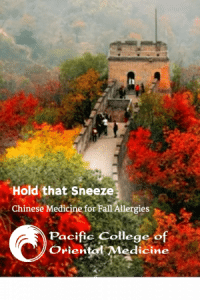When allergies strike, they can affect almost every activity you do—from your voice and breathing to headaches and even how you approach your workflow, allergy symptoms can make it difficult to get through the day. One of the most common forms of seasonal allergies is allergic rhinitis, which affects the sinuses. Symptoms include sneezing, congestion, runny nose, and red, itchy eyes. Western medicine typically prescribes antihistamines, decongestants, or drugs that act upon the nervous system. Steps can also be taken to avoid the allergens altogether. While these prescriptions may be effective in treating the allergic response, they often have undesirable side effects, such as drowsiness, immune system suppression, and eventually, over-reliance on medications.
Holistic Alternatives to Western Medicine for Allergy Treatment
Holistic medicine like traditional Chinese medicine (TCM) can offer a natural alternative to these Western approaches, one that doesn’t include side effects. TCM strives to treat the whole person and recognizes that people with chronic allergies often show signs of other health imbalances, such as what is known as spleen or kidney deficiency, or even lung problems. TCM considers allergies or hay fever to be a manifestation of wind invading the upper body. This occurs because one’s qi (or energy source) has been weakened, which explains why a Chinese herbalist may address these allergies by building up the body’s immunity and defensive qi.
An acupuncturist or TCM practitioner’s goal is not only to treat a patient’s current symptoms and provide immediate relief, but also to treat any underlying immune system imbalances that may be the real cause of one’s allergy problems. Such treatments may take the form of acupuncture and revising one’s diet, including the addition of specific herbal formulas.
Dietary Adjustments and Herbal Remedies for Allergy Relief
If you’re suffering from allergic rhinitis, there are some foods to avoid. Certain foods like full-fat dairy products, cheese, and chocolate can create more mucus in the body and should be avoided. Sugar and soy-heavy foods can also cause this problem for some people. Reduce your intake of white flour and pastas as well as dried fruits and wine, which contains sulfites and can spark this allergic condition.
There are also some foods to explore while you have sinus allergies, including various curries. Curry is rich in turmeric, which helps calm inflammation (and also has many other wonderful healing properties). Garlic, onions, horseradish, and root ginger are great anti-inflammatory foods as well. If you do cut out dairy, try alternatives like organic rice or almond milk.

If you think a career in holistic medicine is something you would like to pursue, contact us and speak to an admissions representative to get started on your new journey!
If you think a career in holistic medicine is something you would like to pursue, contact us and speak to an admissions representative to get started on your new journey!
Tailored Herbal Formulas and Teas for Alleviating Allergy Symptoms
There are many holistic Chinese herbal formulas that TCM practitioners use to treat allergies. Xiao Qing Long Wan or Minor Blue Dragon is one often-prescribed formula. It is usually taken when one suffers from a sensitivity to cold, or to treat chills, fever (without sweating), body aches, wheezing, a cough that produces clear to white mucus, congestion in the chest, and a thick white coating on the tongue. The pills should be taken with plenty of water and for a short duration only.
Astra 8, another herbal formula, combines the advantages of an immune system enhancer with an energy tonic. It contains astragalus (huang qi), an herb that some believe can enhance the body’s immune system and offers antiviral properties. The herbs in Astra 8 are also qi tonics that support astragalus in boosting the immune and energy systems. Other formulations include Pei Min Kan Wan, which can relieve the discomfort of fall allergies, and Fang Feng Xin Yi Wan, which may help those suffering from hay fever.
The herbs above are just examples of why certain herbs are chosen to treat allergies; a TCM practitioner will develop an herbal formula specific to your case. Another tip you can try at home is to try replacing coffee with catechin-rich green tea, which provides anti-allergy benefits. Even chrysanthemum tea (which is made from dried flowers) can also help reduce allergy symptoms. Introducing radishes into your diet can also help, as radishes are known to cool and moisten, which makes them ideal for treating dry, itchy allergy eyes. They can also help clear the sinuses, drain mucus, and ease sore throats.
Traditional Chinese medicine can assist you in overcoming your allergies, whether used alone or in conjunction with a Western medical prescription. There’s no need to suffer—many natural options are available, and a TCM practitioner can help detail which ones are right for your specific case.
Sources
Vieira, Dr. Karen, 500 of the Most Important Health Tips You’ll Ever Need: An A-Z of Alternative Health Hints to Help Over 250 Conditions, Cico Books, 2011
Rost, Amy, Natural Healing Wisdom & Know-How: Useful Practices, Recipes, and Formulas for a Lifetime of Health, Black Dog & Leventhal, 2009
Featured Posts:

